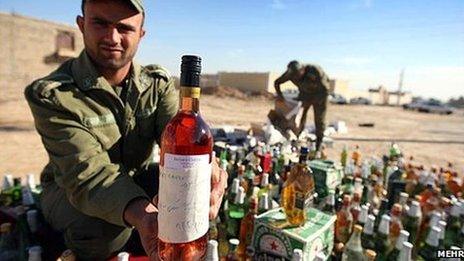Iran's 'hidden' alcoholism problem
- Published

Alcohol has been prohibited in Iran since the Islamic revolution in 1979
Iranian health officials have expressed deep concern over rising alcohol intake, calling for measures to tackle the issue.
The warning is significant given that Iran banned alcohol after the 1979 Islamic revolution. But there is no consensus on how to address the problem. Some authorities have tried to cover up the issue.
Although there had been warnings by low-key figures over the level of alcohol intake, it was a recent statement by a senior health official that led to an intense debate about how to tackle the problem.
"We receive worrying reports from hospitals and physicians about an increase in alcohol consumption in the southern districts of Tehran," said Baqer Larijani, the head of the Health Ministry's Policy-Making Council.
Abbasali Nasehi, the director-general of the Health Ministry's Mental Health Department, expressed similar concerns, saying: "We have little information about alcohol addiction in the country. We have around two million [drug] addicts in the country, and some of them are also addicted to alcohol."
Iran's police chief, Esmail Ahmadi-Moqaddam, had previously said there were only 200,000 alcoholics in Iran, but others had cast doubts about the figure, saying it would be higher.
Drink-driving
Another concern raised by health officials and the police is a rise in drink-driving. In 2011-2012, Iran's police withdrew the driving licences of 829 drivers, including 43 women, who had failed to pass alcohol and drug tests.
Most recently, alcohol tests taken from drivers in Tehran in the period of 20 April-20 May showed that 26% of them were drunk.
It is difficult to make an exact comparison between drink driving in Tehran and other capital cities because of a lack of accurate information. But a comparison with the findings of London's Metropolitan Police might be helpful.
For example, during the Met Police's drink-drive campaign from 1-31 December 2008, over 13,500 breath tests were administered and more than 1,100 people, or around 9%, were arrested.
A further major concern of Iranian health officials is a general unwillingness among relevant authorities to admit to such problems.
"As the consumption of alcoholic drinks is haram [religiously forbidden], some officials are just trying to conceal the facts... But the lack of data on alcohol consumption and consumers is itself a serious threat," wrote a conservative news website on 15 May.
Even the chief of police, Ahmadi-Moqaddam, has criticised the attempts to conceal data on alcohol abuse.
"There have always been attempts to conceal alcohol-related problems in the country, but alcohol consumption and an increase in alcoholism are facts."
Lucrative market
Based on statistics available in 2011, every year around $730m- (£465m-) worth of alcoholic drinks are smuggled into Iran. Some 80% of the alcohol is brought in through its Western border, from Iraqi Kurdistan. Police were able to seize just a quarter of the smuggled alcohol.
According to the border police, the amount of alcohol seized in the year ending March 2012 increased by 69%.
But "at best, the amount of alcohol that is confiscated is only 20 to 30% of the total volume of alcohol in the country," said Hasan Musavi-Chelak, the head of the Social Workers Society.
It is estimated that around 60m to 80m litres of alcoholic drinks are smuggled to Iran each year. This amount is in addition to the spirits made domestically, including the popular "araq" made from fermenting and distilling raisins.
References to wine and drinking are an inseparable part of Persian poetry. Poems by Omar Khayyam (1048-1131) and the Sufi mystic Mawlana Jalaloddin Balkhi (1207-1273), known in the West as Rumi, are enriched with references to wine.
But since the revolution, the authorities have tried to interpret these purely within a spiritual context, especially because the late Ayatollah Khomeini used the same terminology in his poetry.
Alcohol was banned and bars closed down a few months after the revolution. With the introduction of Islamic law, or Shariah, drinkers faced severe punishments such as hefty fines and even public lashings.
But people continued consuming home-made hooch and smuggled alcohol despite all the restrictions.
BBC Monitoring, external selects and translates news from radio, television, press, news agencies and the internet from 150 countries in more than 70 languages. It is based in Caversham, UK, and has several bureaux abroad. For more reports from BBC Monitoring, click here
- Published14 October 2024
